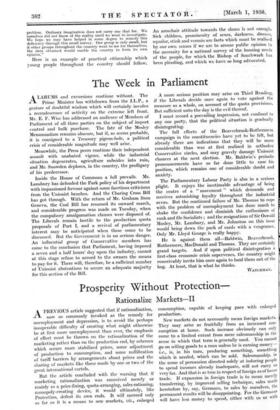The Week in Parliament
ALARUMS and excursions continue without. The Prime Minister has withdrawn from the I.L.P., a gesture of doubtful wisdom which will certainly involve a recrudescence of activity on the extreme left front. Mr. E. F. Wise has addressed an audience of Members of Parliament of all. three parties on the subject of import control and bulk purchase. The fate of the Mosley Memorandum remains obscure, but if, as seems probable, it is consigned to a Treasury pigeon-hole, a political crisis of considerable magnitude may well arise.
Meanwhile, the Press peers continue their independent assault with unabated vigour, while the industrial situation degenerates, agriculture subsides into ruin, and Mr. Snowden deplores, in the country, the profligacy of his predecessor.
Inside the House of Commons a lull prevails. Mr. Lansbury has defended the Park policy of his department with impassioned fervour against some facetious criticisms from the Unionist benches. And the Charing Cross Bill has got through. With the return of Mr. Graham from Geneva, the Coal Bill has resumed its onward march, and considerable progress was made on Tuesday, when the compulsory amalgamation clauses were disposed of. The Liberals remain hostile to the production quota proposals of Part I, and a revival of parliamentary interest may be anticipated when these come to be discussed. But the Government is in no serious danger. An influential group of Conservative members has come to the conclusion that Parliament, having imposed a seven and a half hours' day upon the industry, cannot at this stage refuse to accord to the owners the means to pay for it. There will, therefore, be a sufficient number of Unionist abstentions to secure an adequate majority for this section of the Bill. A more serious position may arise on Third Reading, if the Liberals decide once again to vote against the measure as a whole, on account of the quota provisions. But sufficient unto the day is the evil thereof.
I must record a prevailing impression, not confined to any one party, that the political situation is gradually disintegrating.
The full effects of the Beaverbrook-Rothermere. campaign in the constituencies have yet to be felt, but already there are indications that they will be more considerable than was at first realized in orthodox Conservative circles, and may gravely damage Unionist chances at the next election. Mr. Baldwin's periodic pronouncements have so far done little to ease his position, which remains one of considerable doubt and anxiety.
The Parliamentary Labour Party is also in a serious plight. It enjoys the inestimable advantage of being the centre. of a " movement " which demands and receives astonishing loyalty throughout the industrial areas. But the continued failure of Mr. Thomas to cope with the problem of unemployment has done much to shake the confidence and diminish the enthusiasm of rank and file Socialists ; and the resignations of Sir Oswald Mosley, Mr. Lansbury, and Mr. Johnston on this issue would bring down the pack of cards with a vengeance, Only Mr. Lloyd George is really happy.
He is against them all—Baldwin, Beaverbrook, Rothermere, MacDonald and Thomas. They are certainly grand targets. And if upon political disintegration a first-class economic crisis supervenes, the country might conceivably invite him once again to haul them out of the bog. At least, that is what he thinks.
WATCHMAN.
























































 Previous page
Previous page